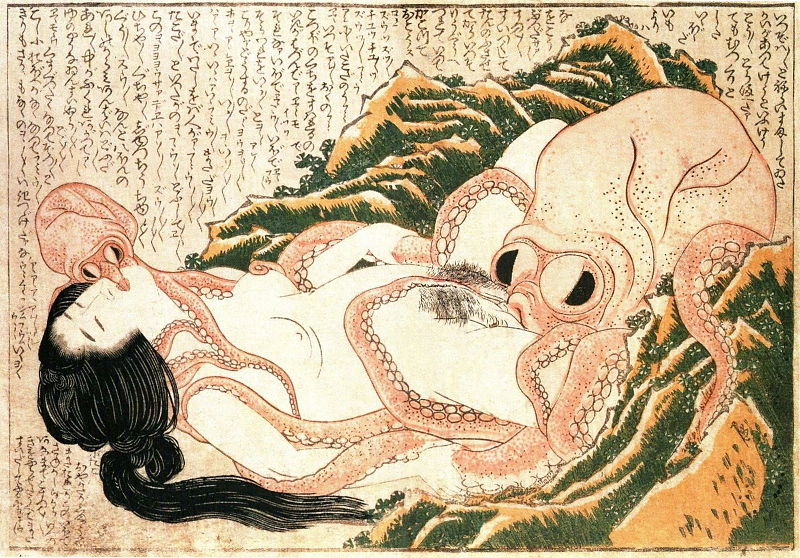“I picked it for its sensuality, but it also in some way reminds me of our business.”
—Bertram Cooper of Mad Men, commenting on The Dream of the Fisherman’s Wife
Warning: This article contains a work of 200-year-old pornographic art and links to some rather smutty dialogue gleaned from the same.
Internet bias
Recently George Takei circulated an item on his Facebook timeline: If someone from the 1950s suddenly appeared today, what would be the most difficult thing to explain to them about life today? Nuseramed answers: I possess a device, in my pocket, that is capable of accessing the entirety of information known to man. I use it to look at pictures of cats and get in arguments with strangers.
I possess a device, in my pocket, that is capable of accessing the entirety of information known to man.
That sounds about right. The Internet has everything. Accessing it you are essentially accessing “the entirety of information known to man.” But that’s obviously, how shall I put this, bullshit. Not only is it BS, but the Internet is in fact profoundly biased, and while it’s convenient to think of it as not, its bias is particularly strong against the pre-Internet, and strongly in favor of the very recent (and of course pop culture and porn).
Only porn it seems had the power to penetrate the membrane that separates my pre-Internet writings from the entirety of human knowledge that we can access today at the stroke of a key or the gesture of a thumb.
Porn (aka shunga, specifically The Dream of the Fisherman’s Wife)

It was the only translation I ever did that had octopi and a naked maiden in it, and that, it seems, is what really mattered.
All of my thoughts and creations from the days of ink and paper, all my Kyoto Journal articles and translations, all of my writings for other printed magazines, all of them—save for this one—are essentially lost to humankind … because they were pre-web. So unless I choose, or someone else chooses—as they did with this one thing—to dredge them up and “preserve” them (like monks transcribing the writings of the ancients in the middle ages) and thus remake them as new to be released from their printed cages to swim free in the warm currents of the Internet, they will vanish, or be as if they never were.
In one of the opening scenes of the third season of Mad Men, the Lane Pryce character is shown standing in amazement in front of an oversized version of The Dream of the Fisherman’s Wife by Hokusai. They show the print in a loving full screenshot just prior to the moment when agency founder Bert Cooper voices his peculiar wisdom that equates this work of shunga with the advertising business.
I wonder if the art directors of Mad Men were aware of this particular Hokusai print because they had seen it in some dusty old book, remembered it from Henry and June, or found it on the Internet. And if they did find it on the Internet, or researched it there, I wonder if it came with a translation of the rather ridiculous and noisy dialogue that dances behind the consensual shell diver and her suitors—care of my pre-Internet self.
If you have a pre-Internet self that you feel is worth adding to what is assumed by many to in fact be ‘the entirety of information known to man’ you will probably have to put it there yourself.
I’m no romantic or Luddite. I am not decrying this wonderful and fruitful thing that is the Internet. I am only saying that if you have a pre-Internet self that you feel is worth adding to what is assumed by many to in fact be “the entirety of information known to man” you will probably have to put it there yourself lest your story either be crafted carelessly by others who do not truly know it, or come to terms with its being forgotten and ignored, not even to live on as a Wikipedia footnote … (my translation has recently been removed due to a lack of citation apparently). My pre-Internet labor is all, it seems, just so much superfluous historical detritus.
The Internet is the great connector but only of what it has in it. So put yours in or be damned by it to silence.
So there it is. The Internet has inherent and irreconcilable biases that are built into its very nature, and my proof of this is in my own story.
‘Nuff said.
Notes:
My translation of The Dream of the Fisherman’s Wife has been reproduced, mostly without credit, at least 800 times by various interested and amused parties across the Internet. It has even been translated back into Japanese for the appreciation of the non-archaic script reading general Japanese public.
“Bobo” and “Tako” (octopus) are both slang references to the vulva.
All the strings of nonsense words in Japanese are various slurping and squishing sounds rendered in creative onomatopoeia by the original author. We found them mostly untranslatable and so chose to simply transliterate.


I was appalled by your article on The Dream of the Fisherman’s Wife.
If you should have cause to write on this subject again, please note that the plural of octopus is either octopuses or octopodes, but never octopi. The same error was made in the James Bond movie Octopussy.
Haha. Corrected. Thanks for taking the time to point this out. The note should also be passed along not only to James Bond movie makers, but to the likes of scholars such as Richard Douglas Lane, Matthi Forrer, and Danielle Talerico all of whom, in their various translations of the work’s title, call them Octopi (see Girl Diver and Octopi, Girl Diver and Two Octopi, Diver and Two Octopi respectively).